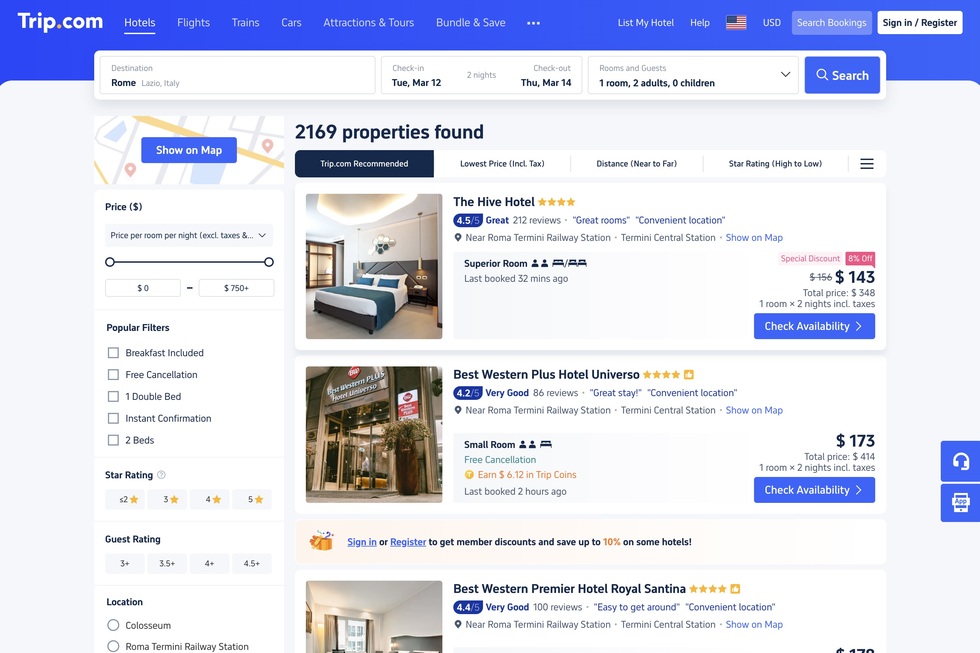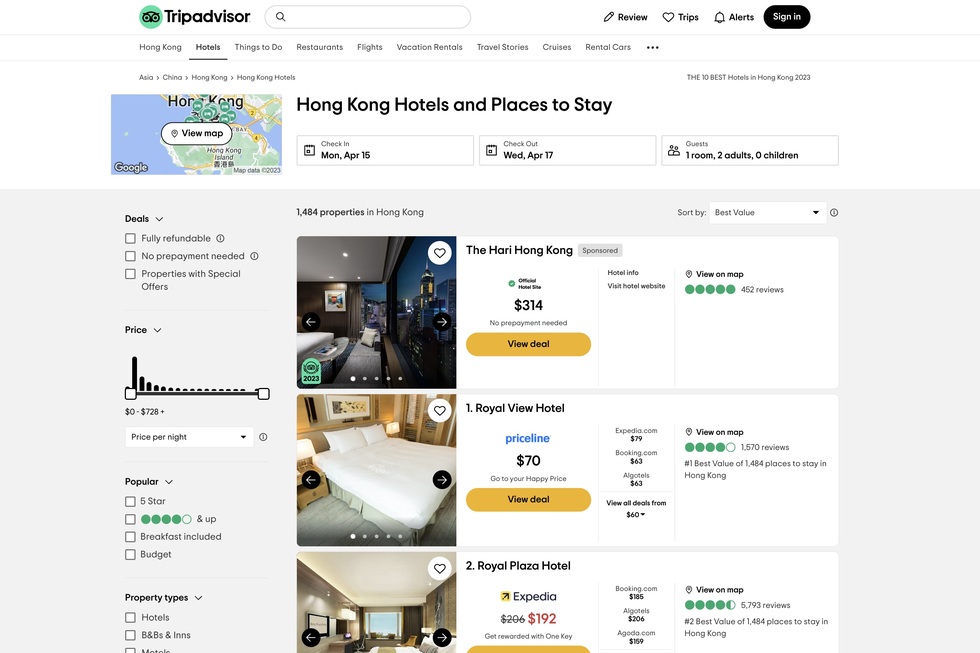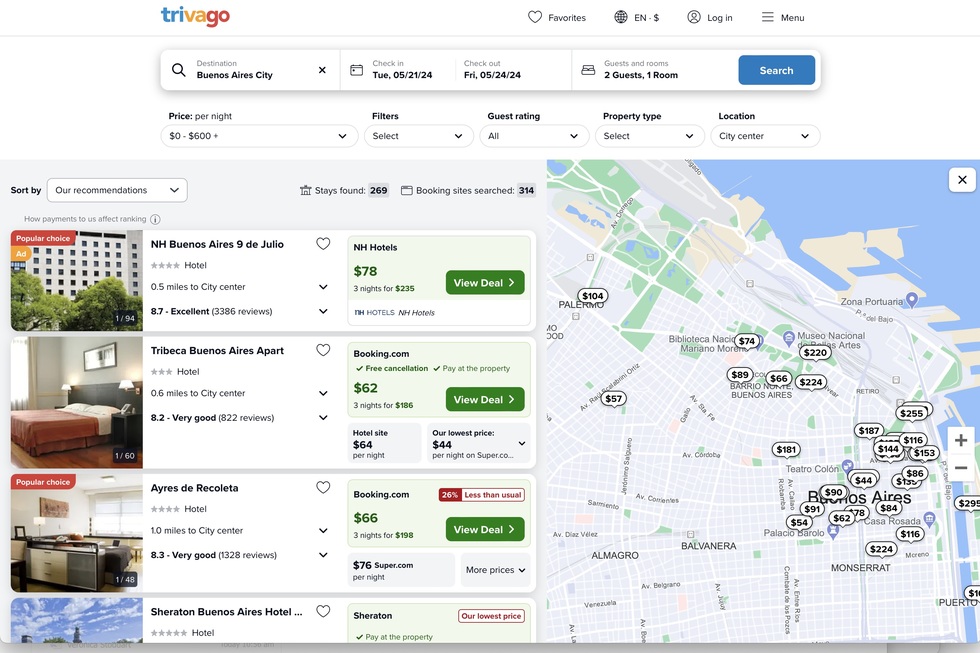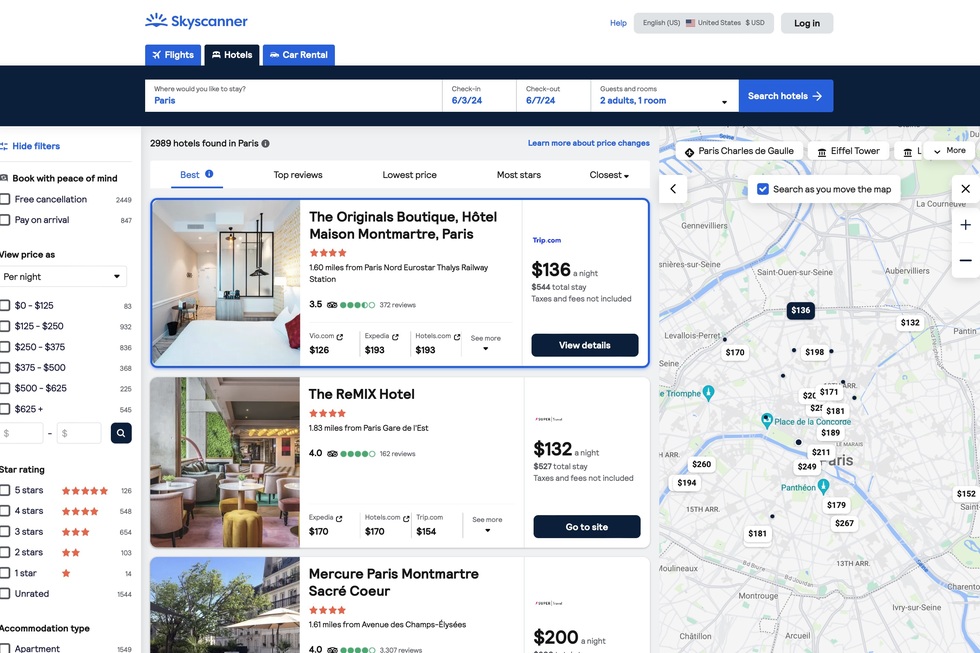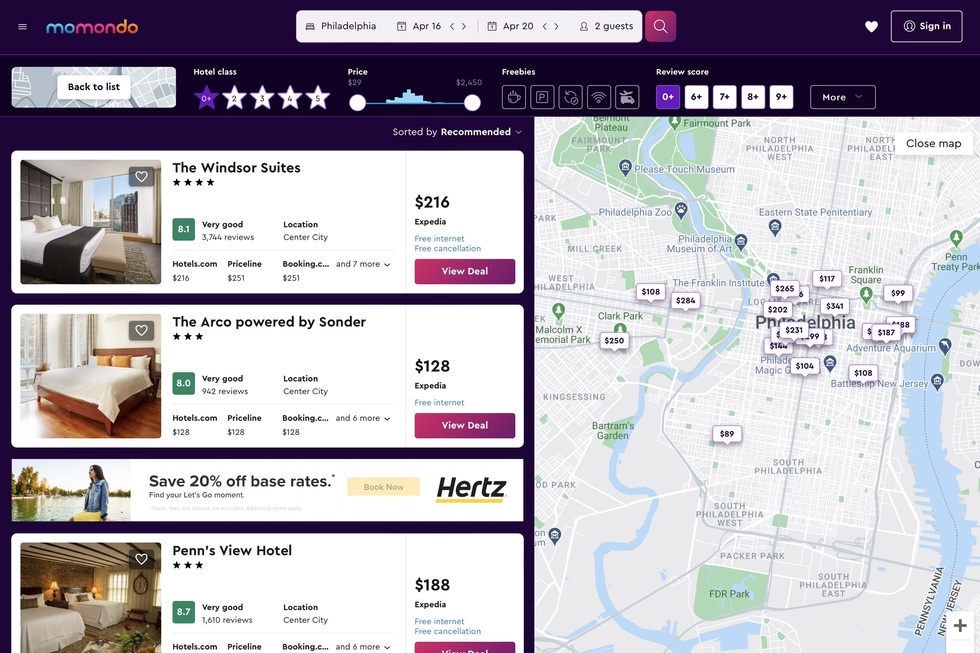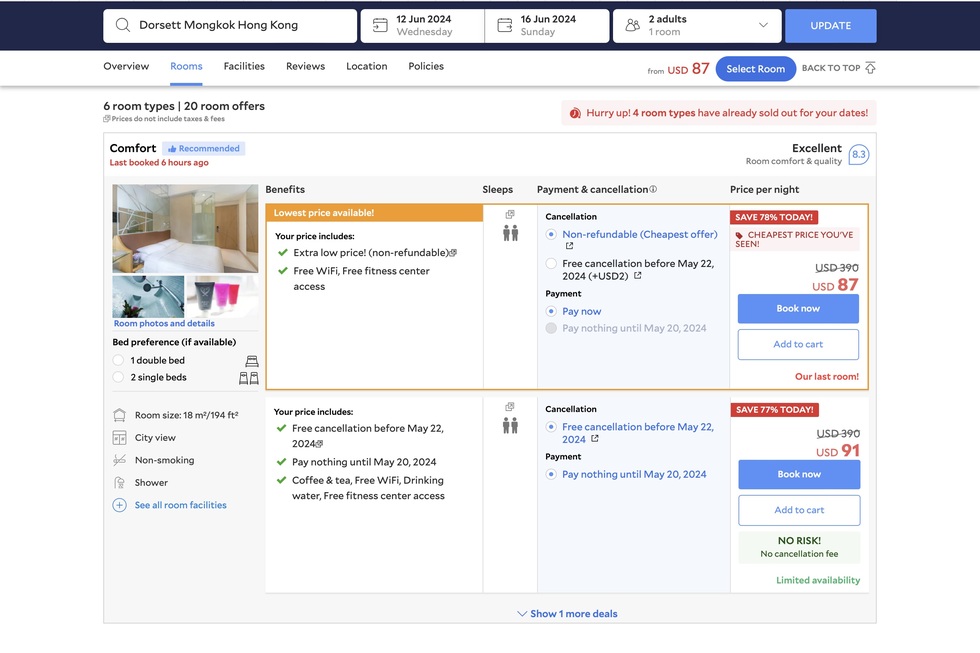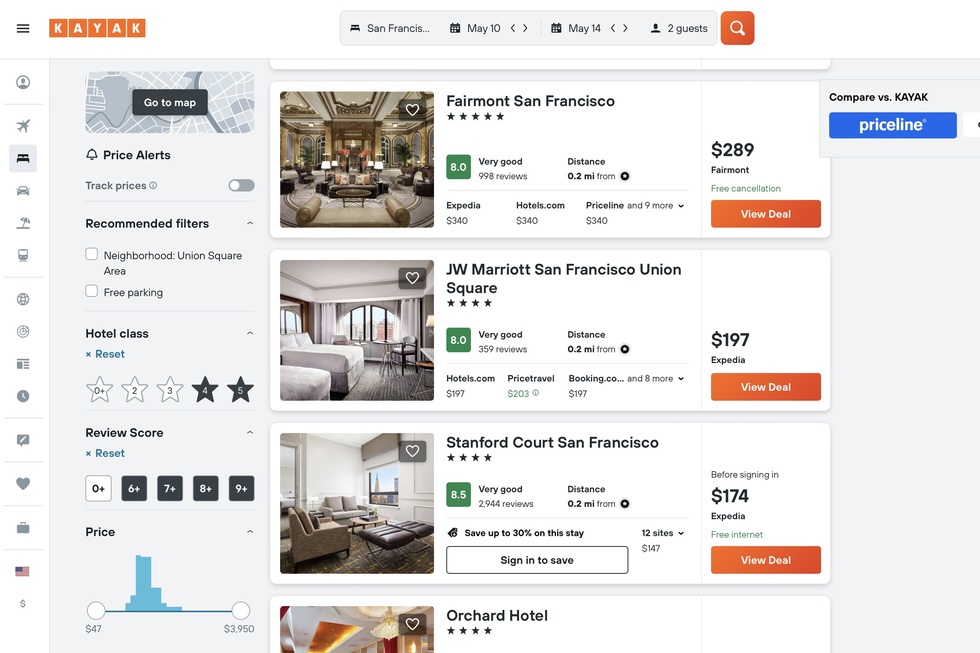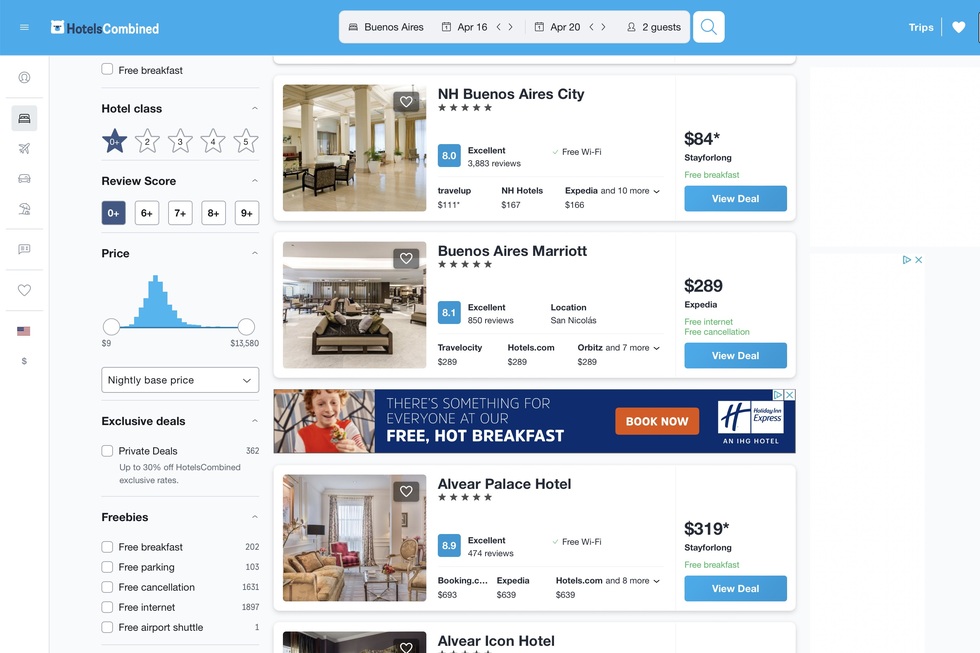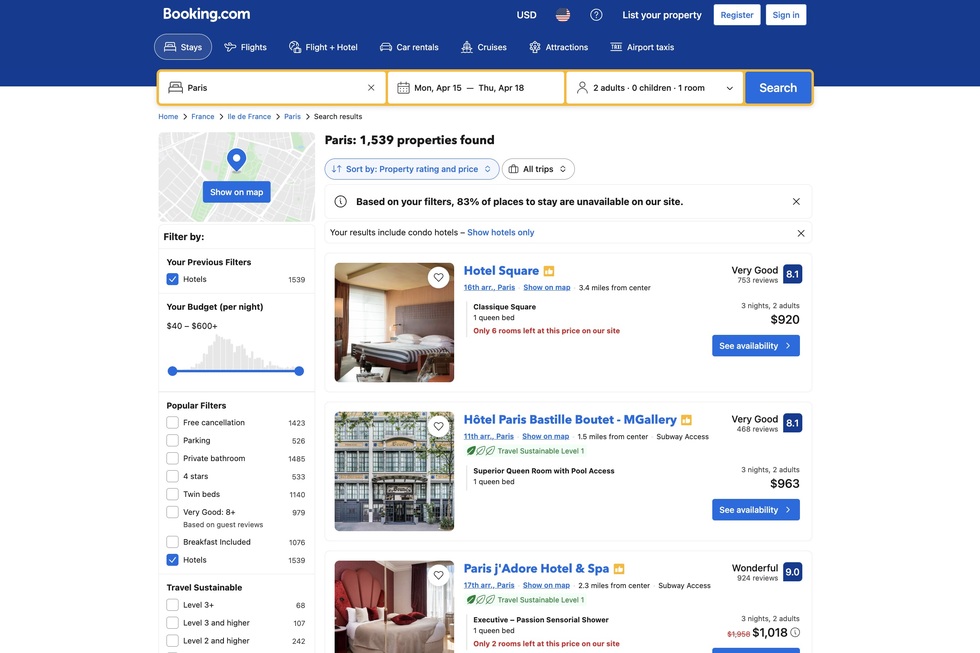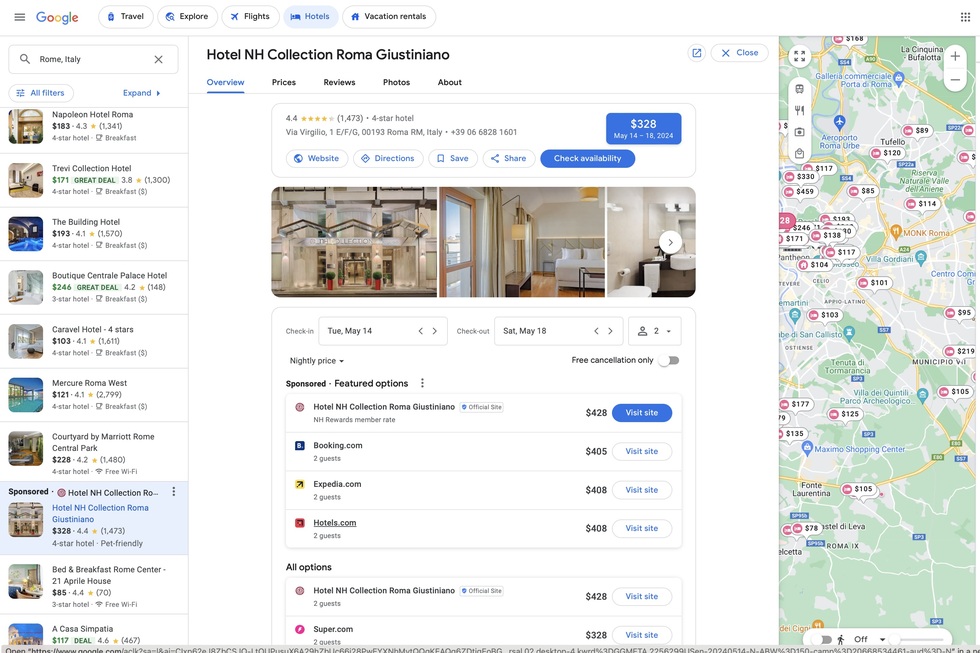Best and Worst Hotel Booking Sites for 2024
By Reid BramblettThe well-known investment disclaimer “past performance is no guarantee of future results” could also apply to having a favorite hotel booking site. Hotel search engines that performed well a year ago can change for the worse and deliver poor results today.
Frommer’s regularly dives into the data to determine the best hotel sites, and this year produced quite a shakeup in our top 10. Three onetime stalwarts (Priceline, Expedia, and Hotels.com) were driven off our list by newcomers, including one site that had never before earned a Frommer's Top 10 slot after eight years of trying. Meanwhile, one formerly mighty booking engine that once dawdled in the bottom half of our ranking has unexpectedly come roaring back and this year, it nearly nabbed the top spot.
First, it helps to understand the playing field. There are basically three types of websites that people can use to find hotels: OTAs (online travel agencies); the hotels’ own websites, which may offer special member deals OTAs can’t match; and aggregators, or meta-search engines, which don’t actually handle reservations, but trawl both OTAs and hotel sites to return a list of results, then send you to your choice of them for final reservations.
We tested both OTAs and aggregators (and as a general rule, you should always double-check results from both types of sites against rates offered by the hotels’ own websites). Why include OTAs at all when there are aggregators that canvass them? Well, some aggregators don't comb through booking engines as well as they should. In fact, our champ for total number of hotels found in most cities was actually an OTA, and you'd think it would have been an aggregator that scans lots of websites. We blame algorithms.
A warning about booking: Hotel aggregator sites sometimes display results from booking services that post amazingly low prices but have sketchy track records for customer service. If a hotel booking website directs you to a company you’ve never heard of, before giving it a penny, do a quick search for reviews or scams associated with that business name, and also perform a quick reputation search (based on the website’s hometown) at the Better Business Bureau (bbb.org).
Also keep a close eye on fees, which are unregulated in the U.S. and can stack up fast, and don't pay much attention to user reviews of hotels—AI has made user reviews easy to rig with fakes.
When you're making reservations, remember that some OTAs will give you a discount of 4–6% if you sign in for free. Member savings on aggregator sites are less reliable, and usually only around 1–2%.
Finally, a tip for travelers with some technical savvy: To ensure you always get the actual total prices including all taxes and fees, consider using a virtual private network, or VPN, to do your hotel shopping through a server based in Ireland, where EU regulations require all those charges to be announced up front. Any server in continental Europe will actually do, but choosing Ireland has the benefit of automatically showing results in English. Clear your browser’s cookies first so the hotel sites won’t remember any previous visits.
We threw 54 room reservation scenarios at the major sites to determine which ones could find the lowest prices and the most options. We used the standard, non-member rates for all our tests, and when testing aggregators, we discarded price quotes from websites with sketchy reputations and only considered the prices from reputable resellers.
To start, we tallied the number of choices each contender could rustle up in four price categories in six major cities: San Francisco, Philadelphia, Rome, Paris, Hong Kong, and Buenos Aires.
Then, for each city, we searched for the lowest rates each site could find at four specific downtown hotels in varying price ranges for a mid-week, shoulder-season stay on the same date three months out. That advance purchase requirement assured we would see a level playing field for the same rooms on the same date, and it removed the influence of both high-season spikes and last-minute discounts.
We awarded points to hotel websites that found the lowest rates on a given hotel—and subtracted points if it returned higher prices than the others—in a rigorous, weighted system designed to determine which hotel reservations site saved us the most money consistently. We also paid extra attention to how honest websites were about disclosing mandatory added fees. If websites try to make rooms seem cheaper than they really are, we warn you.
So who succeeded on the best prices and who didn’t measure up? Read on...
OTA
Trip.com’s results were scattershot, and to be honest, it really only excelled at finding good prices and numbers in Paris (and, to a lesser extent, Rome), so maybe consider checking it for European adventures. We were impressed that Trip.com includes the full prices, taxes and fees included, on its results page, and by the fact that you can even sort properties by that true cost, which was unusual among websites.
Then again, Trip.com also committed some unforced errors, such as telling us one particularly Philly hostel was sold out when all the other sites we checked there were beds available.
Aggregator
Aggregator
Trivago has fallen from #3 to the bottom half of our rankings. It did sometimes win the pricing game by finding a rate direct from the hotel (a trick that our #1 also knew), and it was usually average or better on price. That is, except in Buenos Aires, where Trivago returned the lowest number of hotel results of anyone, and it couldn’t even find a single quote for one of our test properties that other sites found easily.
What’s more, it seems to favor its partners over you, the customer. Like other aggregators, it tended to push results from Booking.com and even then, it didn’t always lead with the lowest price it found. What good is a hotel booking site that hides the lowest prices? Even more concerning, when Trivago did lead with a too-good-to-be-true rate, it often came from from a notoriously dubious third-party site, including in its supposedly vetted "Trivago Book & Go" results.
Trivago was also inconsistent. On its first try at the posh Paris pad, it claimed there were no rooms available. Since we had already tested a dozen other sites, we knew that couldn't possibly be true, so we ran the search again and, suddenly, up popped a good price. Had we not searched a second time, it would have failed our test. And what good is a hotel booking site where you have to search twice?
While Trivago has recently improved its filters—you can now get granular on things like price ranges or distance from a desired address (though it still lacks a handy “neighborhoods” filter)—Trivago was frankly more annoying to use than other top sites. It was also the only aggregator in our top 10 that never gave an indication of how much taxes and fees were—you have to click over to the booking site for that. What good is a hotel search site that won’t tell you how much you’ll end up paying?
Aggregator
Skyscanner, one of the best airfare aggregators in the business (and we ran the tests to prove it), has also managed to build a decent hotel search engine, and this year, it debuts on the Frommer’s Top 10 with solid results that only once failed to find a below-average price—and that was for our budget Buenos Aires hotel where even our #2 stumbled and Trivago failed entirely.
Skyscanner was particularly strong in Europe, and its filter set was fairly good. While Skyscanner didn’t offer the option to calculate full rates with taxes and fees the way some better-performing sites did, at least it acknowledged when they weren’t included.
So why is Skyscanner just #7? Aside from mostly middlin’ price discoveries, it seemed to get its lowest rates from less-than-reliable sources like shifty online travel agencies. Some results were even culled from other aggregators and weren’t actually available once we clicked over. (To its credit, Skyscanner posts a disclaimer about this practice at the top of its results.). On the other hand, unlike some other search engines, it has partnered with a reputable OTA to offer direct bookings: Trip.com.
On the whole, Momondo isn't quite as magical with hotel bookings as it is with finding airfare.
OTA
Agoda seems to have settled comfortably into the middle of our results, falling one spot from last time but still ranking as the second-best OTA in general. Agoda was far and away the best site for reservations outside of North America and Europe. That makes sense, since it started as an Asia specialist.
Aggregator
The O.G. travel aggregator has bounced around in our ratings over the years, but it seems to be finding secure footing among the top five. Kayak was, impressively, one of only three sites that never returned a price or hotel count lower than the average.
Kayak has a solid set of filters—including very nice fill-in window for location so you can name any landmark or address. It also gives you that crucial option to show rates inclusive of taxes and fees.
Aggregator
OTA
Aggregator
For Frommers' Top Ten Airfare Booking Sites, click here!








